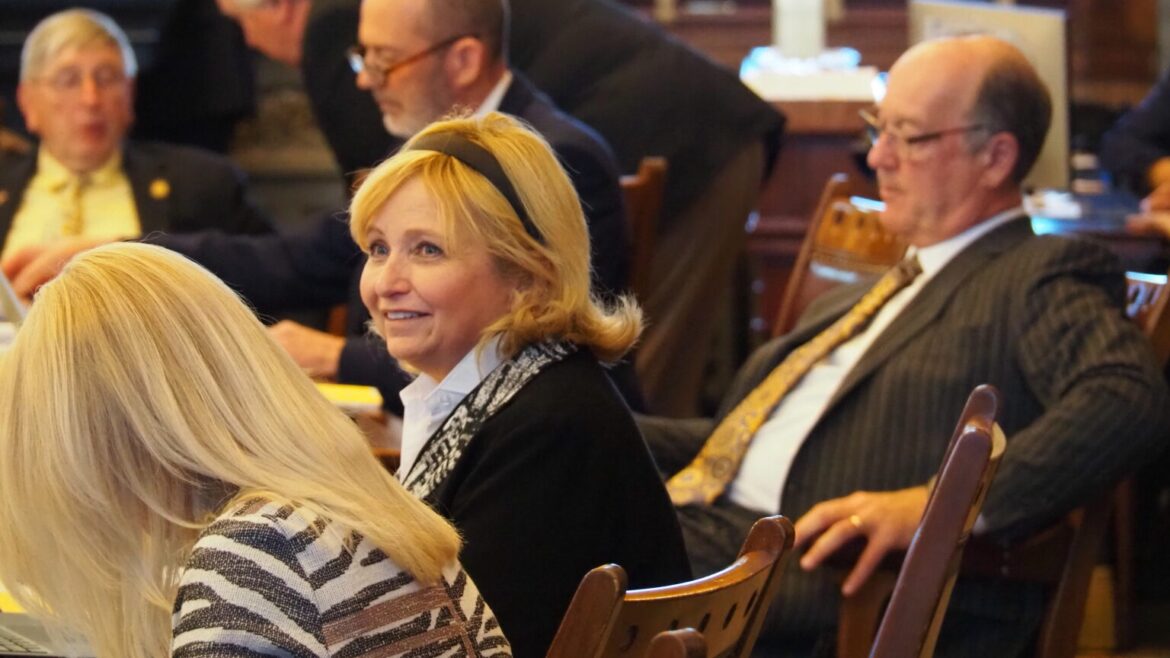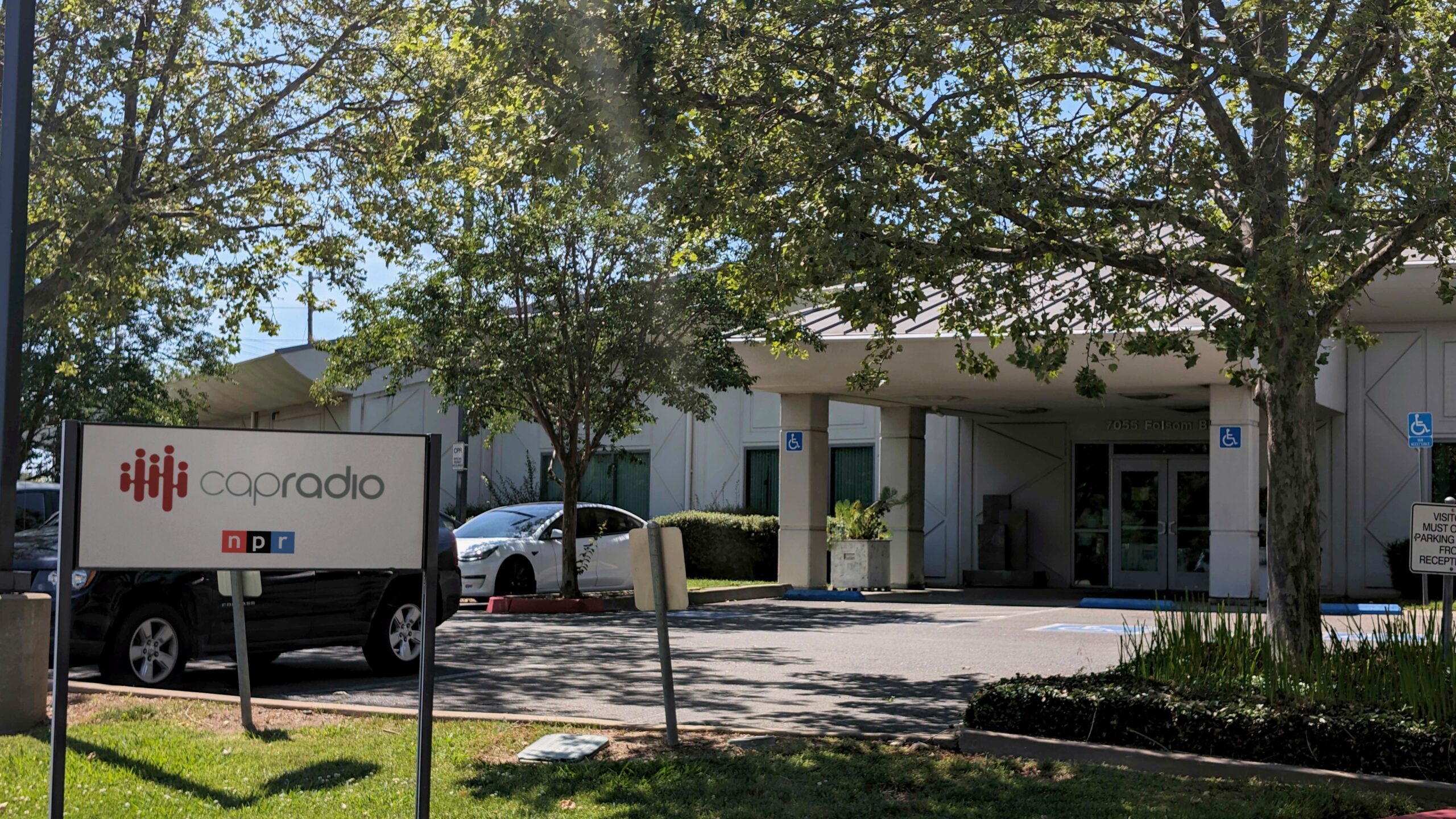State senator threatens public broadcasting funding over film about LGBTQ+ Kansans

Tim Carpenter / Kansas Reflector
Sen. Caryn Tyson, R-Parker, sits at her desk on the floor of the Kansas Senate in 2023. She was angered by footage in a documentary broadcast on PBS.
This op-ed originally appeared on Kansas Reflector and is republished here under a Creative Commons license.
When Republican state Sen. Caryn Tyson denounced a public broadcasting program and called for eliminating all funding for Kansas PBS stations, one important detail was missing.
The name of the program.
“I was completely offended by it, and so I am absolutely going to strike their funding,” Tyson told the Senate commerce committee Wednesday. On Thursday, the panel decided against recommending that lawmakers slash the entire $500,000 public TV allotment, settling on a 10% slice — $50,000 — instead.
By nature, journalists are nosy people. After reading about and watching the hearing, I wanted to know what had gotten under Tyson’s skin. She didn’t identify the offending show during the hearing, or sentiment she found so appalling. The Parker resident didn’t respond to repeated inquiries from Kansas Reflector staff, either. That made me even more curious. The public deserves to know.
There were hints. Tyson called the show a documentary at one point and said it criticized the committee’s chairwoman, Renee Erickson, R-Wichita.
After three days of emailing and calling politicians, operatives and folks in the news media, I identified the program. It was a corker. No Place Like Home: The Struggle Against Hate in Kansas, a documentary about LGBTQ+ Kansans, was broadcast on Topeka and Kansas City PBS stations last year.
This film has impeccable credentials. The source was a University Press of Kansas book written by former Kansas Reflector opinion editor and current KCUR content director C.J. Janovy. Director Kevin Willmott won an Academy Award for co-writing BlacKkKlansman with Spike Lee. Narrator Melissa Etheridge is, well, Melissa Etheridge. These folks are the best of Kansas. They are the kind of people — creatives, members of underrepresented groups — we should be trying to attract and retain.
The documentary shows Erickson advocating for a bill that bans transgender youth from girl’s and women’s sports, following a playbook of attacks on trans rights used in GOP-run states across the nation. (The proposal finally became law last year after falling short in earlier sessions.) It juxtaposes her public statements with LGBTQ+ children’s struggles to thrive in an often-hostile society.
In Tyson’s eyes, though, Erickson was the victim.
“I was just completely distraught over what they did and how they are using their microphone for negative promotion,” she said.
Chilling effect
The big problem with Tyson’s move? Like the law enforcement raid on the Marion County Record newspaper in August, it creates a chilling atmosphere. This time, not just for journalists, but for all creatives and LGBTQ+ people in Kansans.
Don’t just take my word for it.
The recommended cut “smacks of governmental retaliation in violation of the First Amendment,” said Maxwell Kautsch, president of the Kansas Coalition for Open Government and a media lawyer.
“Even if the recommendation is ultimately rejected by the Ways and Means Committee later this week, the mere threat of cutting public funding in direct response to editorial content with which members of the Legislature disagree has a chilling effect on the right to expression for all Kansans.”
Members of the commerce committee reacted coolly to her request. Republican Sens. John Doll and Brenda Dietrich pushed back during Thursday’s hearing, with Doll asking whether the state should cut broadband funding because he disagreed with online shows by disgraced broadcaster Alex Jones.
Tyson didn’t much like that comparison.
Even Erickson, who ended up breaking a tie to support the $50,000 cut, distanced herself from her fellow senator.
“I have not asked for this recommendation,” she said to the committee. “While I may have been one of many who were targeted, I have not asked for this. I do not make my policy decisions based on personal attacks on me or otherwise.”
As Kautsch noted, the Ways and Means committee takes action next. It takes up the recommendation on Wednesday.
Willmott, the documentary’s director, both defended the film and offered important context.
“We’re proud of the film and proud to stand with the families of trans folks who told us their stories,” he said in a statement. “Since the film first aired we’ve gotten nothing but positive feedback. None of the film’s funding came from PBS.”

The best of Kansas
Both I and Kansas Reflector staff reached out to Tyson multiple times seeking her perspective. I sent her two requests for comment via email. Reporter Rachel Mipro spoke to her briefly on the phone before the senator complained of technical problems. Mipro subsequently texted her and called back, but the senator did not answer, and her voicemail was full.
Residents who attended a Saturday town hall meeting featuring Tyson submitted questions about her attempt to punish Kansas PBS. The questions weren’t asked or answered.
Perhaps the senator knew that her complaints wouldn’t survive scrutiny against the work of an Oscar winner, a Grammy winner and incredible journalist.
Regardless, what an awful message to send to Kansas journalists.
What an awful message to send to LGBTQ+ Kansans.
What an awful message to send to anyone wondering whether the Sunflower State welcomes those who are different.
Be quiet, lawmakers appeared to say. Or suffer the consequences.
As Tyson put it memorably on Thursday: “I just don’t think we can tolerate it, and the way we get the message to them is by impacting their purse. That’s what the Legislature does. We have the hammer, and I’m going to swing this hammer in a large way.”
The senator has her own right to free speech. But as a lawmaker, she should be more careful about violating the spirit of our founding principles.
The film “is protected expression under the First Amendment of the U.S. Constitution,” Kautsch noted. “There are no false statements contained in the film, and those criticized are public figures with a reduced expectation of privacy when performing their official duties.”

What comes next
Confirmation that No Place Like Home raised Tyson’s ire came from Val VanDerSluis, general manager of KTWU, the Topeka PBS station, and chairwoman of the Kansas Public Broadcasting Council. Full disclosure: Kansas Reflector staff, including me, have appeared as guests on the station’s programming.
She told me that she had spoken to the senator after the committee meeting Thursday, where members recommended the $50,000 cut. VanDerSluis said the two had a “very good dialogue” and that Tyson was a PBS fan.
The two “were able to clear up some misunderstandings on the broadcast of the documentary,” she said. “It was a very positive discussion.”
At this point, the goal turns to reclaiming those lost funds.
“I am looking forward to being present at the statehouse the next several days to help answer questions and clarify our mission and the services the nine stations that make up Kansas Public Broadcasting brings to our viewing communities in Kansas,” VanDerSluis said. “I am confident we can maintain our funding just by listening and helping others understand what we do as Kansas public broadcasters.”
Public broadcasting, in the words of PBS, aims to “educate, inspire, entertain and express a diversity of perspectives.” The story told in No Place Like Home has earned its place in the grand tradition. A tradition, one must note, that has been targeted in other statehouses.
I’m glad VanDerSluis is optimistic.
Yet, as I wrote shortly after Marion police raided their community newspaper, seizing laptops and phones and generating international outrage, I worry that damage has already been done. A message has been sent.
“At minimum, editorial decision-makers at public broadcast stations are now aware that to avoid the threat of future budget cuts, they may need to consider not only whether a program is protected expression under the First Amendment, but also how it might be received by elected officials,” Kautsch said.
You don’t have to like or approve of the documentary (although I recommend you at least watch it). You don’t have to like or approve of this column. But every Kansan should grasp that the freedom to express ourselves, without fear of government retribution, forms the very bedrock of our civil society.
If that bedrock crumbles, we all fall.
Clay Wirestone is Kansas Reflector opinion editor.





